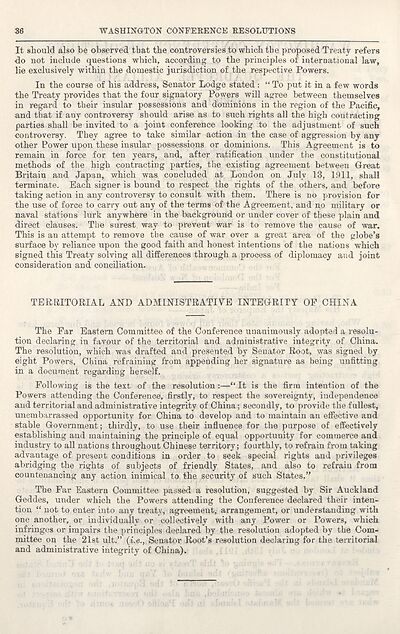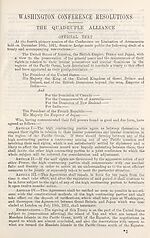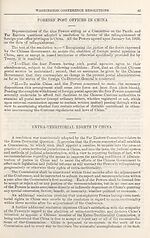1934
(72) Page 36
Download files
Complete book:
Individual page:
Thumbnail gallery: Grid view | List view

36
WASHINGTON CONFERENCE RESOLUTIONS
It should also be observed that the controversies to which the proposed Treaty refers
do not include questions which, according to the principles of international law,
lie exclusively within the domestic jurisdiction of the respective Powers.
In the course of his address, Senator Lodge stated : “ To put it in a few words
the Treaty provides that the four signatory Powers will agree between themselves
in regard to their insular possessions and dominions in the region of the Pacific,
and that if any controversy should arise as to such rights all the high contracting
parties shall be invited to a joint conference looting to the adjustment of such
controversy. They agree to take similar action in the case of aggression by any
other Power upon these insular possessions or dominions. This Agreement is to
remain in force for ten years, and, after ratification under the constitutional
methods of the high contracting parties, the existing agreement between Great
Britain and Japan, which was concluded at London on July 13, 1911, shall
terminate. Each signer is bound to respect the rights of the others, and before
taking action in any controversy to consult with them. There is no provision for
the use of force to carry out any of the terms of the Agreement, and no military or
naval stations lurk anywhere in the background or under cover of these plain and
direct clauses. The surest way to prevent war is to remove the cause of war.
This is an attempt to remove the cause of war over a great area of the globe’s
surface by reliance upon the good faith and honest intentions of the nations which
signed this Treaty solving all differences through a process of diplomacy and joint
consideration and conciliation.
TERRITORIAL AND ADMINISTRATIVE INTEGRITY OF CHINA
The Far Eastern Committee of the Conference unanimously adopted a resolu¬
tion declaring in favour of the territorial and administrative integrity of China.
The resolution, which was drafted and presented by Senator Root, was signed by
eight Powers, China refraining from appending her signature as being unfitting
in a document regarding herself.
Following is the text of the resolution:—It is the firm intention of the
Powers attending the Conference, firstly, to respect the sovereignty, independence
and territorial and administrative integrity of China; secondly, to provide the fullest,
unembarrassed opportunity for China to develop and to maintain an effective and
stable Government; thirdly, to use their influence for the purpose of effectively
establishing and maintaining the principle of equal opportunity for commerce and
industry to all nations throughout Chinese territory; fourthly, to refrain from taking
advantage of present conditions in order to seek special rights and privileges
abridging the rights of subjects of friendly States, and also to refrain from
countenancing any action inimical to the security of such States.”
The Far Eastern Committee passed a resolution, suggested by Sir Auckland
Geddes, under which the Powers attending the Conference declared their inten¬
tion “ not to enter into any treaty, agreement, arrangement, or understanding with
one another, or individually or collectively with any Power or Powers, which
infringes or impairs the principles declared by the resolution adopted by the Com¬
mittee on the 21st ult.” (i.e., Senator Root’s resolution declaring for the territorial
and administrative integrity of China).
WASHINGTON CONFERENCE RESOLUTIONS
It should also be observed that the controversies to which the proposed Treaty refers
do not include questions which, according to the principles of international law,
lie exclusively within the domestic jurisdiction of the respective Powers.
In the course of his address, Senator Lodge stated : “ To put it in a few words
the Treaty provides that the four signatory Powers will agree between themselves
in regard to their insular possessions and dominions in the region of the Pacific,
and that if any controversy should arise as to such rights all the high contracting
parties shall be invited to a joint conference looting to the adjustment of such
controversy. They agree to take similar action in the case of aggression by any
other Power upon these insular possessions or dominions. This Agreement is to
remain in force for ten years, and, after ratification under the constitutional
methods of the high contracting parties, the existing agreement between Great
Britain and Japan, which was concluded at London on July 13, 1911, shall
terminate. Each signer is bound to respect the rights of the others, and before
taking action in any controversy to consult with them. There is no provision for
the use of force to carry out any of the terms of the Agreement, and no military or
naval stations lurk anywhere in the background or under cover of these plain and
direct clauses. The surest way to prevent war is to remove the cause of war.
This is an attempt to remove the cause of war over a great area of the globe’s
surface by reliance upon the good faith and honest intentions of the nations which
signed this Treaty solving all differences through a process of diplomacy and joint
consideration and conciliation.
TERRITORIAL AND ADMINISTRATIVE INTEGRITY OF CHINA
The Far Eastern Committee of the Conference unanimously adopted a resolu¬
tion declaring in favour of the territorial and administrative integrity of China.
The resolution, which was drafted and presented by Senator Root, was signed by
eight Powers, China refraining from appending her signature as being unfitting
in a document regarding herself.
Following is the text of the resolution:—It is the firm intention of the
Powers attending the Conference, firstly, to respect the sovereignty, independence
and territorial and administrative integrity of China; secondly, to provide the fullest,
unembarrassed opportunity for China to develop and to maintain an effective and
stable Government; thirdly, to use their influence for the purpose of effectively
establishing and maintaining the principle of equal opportunity for commerce and
industry to all nations throughout Chinese territory; fourthly, to refrain from taking
advantage of present conditions in order to seek special rights and privileges
abridging the rights of subjects of friendly States, and also to refrain from
countenancing any action inimical to the security of such States.”
The Far Eastern Committee passed a resolution, suggested by Sir Auckland
Geddes, under which the Powers attending the Conference declared their inten¬
tion “ not to enter into any treaty, agreement, arrangement, or understanding with
one another, or individually or collectively with any Power or Powers, which
infringes or impairs the principles declared by the resolution adopted by the Com¬
mittee on the 21st ult.” (i.e., Senator Root’s resolution declaring for the territorial
and administrative integrity of China).
Set display mode to:
![]() Universal Viewer |
Universal Viewer | ![]() Mirador |
Large image | Transcription
Mirador |
Large image | Transcription
Images and transcriptions on this page, including medium image downloads, may be used under the Creative Commons Attribution 4.0 International Licence unless otherwise stated. ![]()
| Asian directories and chronicles > 1934 > (72) Page 36 |
|---|
| Permanent URL | https://digital.nls.uk/199969996 |
|---|
| Attribution and copyright: |
|
|---|---|
| Description | Volumes from the Asian 'Directory and Chronicle' series covering 1917-1941, but missing 1919 and 1923. Compiled annually from a multiplicity of local sources and research. They provide listings of each country's active corporations, foreign residents and government agencies of all nationalities for that year, together with their addresses. Content includes: various treaties; coverage of conflicts; currencies and taxes; consular fees; weights and measures; public holidays; festivals and traditions. A source of information for both Western states and communities of foreigners living in Asia. Published by Hongkong Daily Press. |
|---|---|
| Shelfmark | H3.86.1303 |
| Additional NLS resources: |

